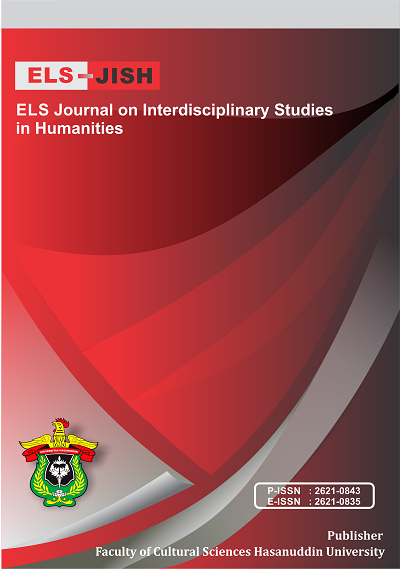A Case Study of Pre-Service Teachers’ Enabling TPACK Knowledge: Lesson Design Projects
DOI:
https://doi.org/10.34050/els-jish.v3i2.10006Keywords:
Challenges, pre-service teacher, TPACKAbstract
Teacher education program are expected to be able in developing pre-service teachers that capable in integrating three domains of technology, pedagogy, and content knowledge (TPACK) for future classroom practices. Every teacher program may be varied and has their own ways in developing TPACK knowledge and skill for pre-service teachers. However, the investigation of lesson design as one of instructional design resulted from the teacher program is rare especially concern on the quality of each domain within lesson design and challenges that were raised within the process of lesson plan making. Therefore, this study aims to explores the TPACK component within of pre-service teacher lesson design project of master degree of teacher education program in Indonesian University through analysing the lesson design project and conducting semi structure interview to provide the justification of determining of each component in the lesson design. The findings show that pre-service teachers’ lesson plan has been represented the domain of TPACK, but there were some domains that not showing strong representation. Also, this study found that the challenges faced by the pre-service teachers were mostly as the reason of lack teaching experiences.
References
Angeli, C., & Valanides, N. (2009). Epistemological and methodological issues for the conceptualization, development, and assessment of ICT–TPCK: Advances in technological pedagogical content knowledge (TPCK). Computers & Education, 52(1), 154–168. https://doi.org/10.1016/j.compedu.2008.07.006
Bell, R. L., Maeng, J. L., & Binns, I. C. (2013). Learning in context: Technology integration in a teacher preparation program informed by situated learning theory. Journal of Research in Science Teaching, 50(3), 348–379. https://doi.org/10.1002/tea.21075
Braun, V., & Clarke, V. (2006). Using thematic analysis in psychology. Qualitative Research in Psychology, 3(2), 77–101. https://doi.org/10.1191/1478088706qp063oa
Caena, F., & Redecker, C. (2019). Aligning teacher competence frameworks to 21st century challenges: The case for the European Digital Competence Framework for Educators ( DIGCOMPEDU) . European Journal of Education, ejed.12345. https://doi.org/10.1111/ejed.12345
Christ, T., Arya, P., & Liu, Y. (2019). Technology Integration in Literacy Lessons: Challenges and Successes. Literacy Research and Instruction, 58(1), 49–66. https://doi.org/10.1080/19388071.2018.1554732
Clark, C. M. (n.d.). Teacher Preparation: Contributions of Research on Teacher Thinking. 8.
Fereday, J., & Muir-Cochrane, E. (2006). Demonstrating rigor using thematic analysis: A hybrid approach of inductive and deductive coding and theme development. 5(1), 80–92.
Flick, U. (Ed.). (2018). The Sage handbook of qualitative data collection. Sage Reference.
Gill, L., & Dalgarno, B. (2017). A qualitative analysis of pre-service primary school teachers’ TPACK development over the four years of their teacher preparation programme. Technology, Pedagogy and Education, 26(4), 439–456. https://doi.org/10.1080/1475939X.2017.1287124
Janssen, N., & Lazonder, A. W. (2016). Supporting pre-service teachers in designing technology-infused lesson plans: Support for technology-infused lessons. Journal of Computer Assisted Learning, 32(5), 456–467. https://doi.org/10.1111/jcal.12146
Janssen, Noortje, Knoef, M., & Lazonder, A. W. (2019). Technological and pedagogical support for pre-service teachers’ lesson planning. Technology, Pedagogy and Education, 28(1), 115–128. https://doi.org/10.1080/1475939X.2019.1569554
Janssen, Noortje, & Lazonder, A. W. (2015). Implementing Innovative Technologies Through Lesson Plans: What Kind of Support Do Teachers Prefer? Journal of Science Education and Technology, 24(6), 910–920. https://doi.org/10.1007/s10956-015-9573-5
Koehler, M. J., & Mishra, P. (2005). What Happens When Teachers Design Educational Technology? The Development of Technological Pedagogical Content Knowledge. Journal of Educational Computing Research, 32(2), 131–152. https://doi.org/10.2190/0EW7-01WB-BKHL-QDYV
Koehler, M. J., Mishra, P., & Cain, W. (2013). What is Technological Pedagogical Content Knowledge (TPACK)? Journal of Education, 193(3), 13–19. https://doi.org/10.1177/002205741319300303
Koehler, M. J., Mishra, P., Kereluik, K., Shin, T. S., & Graham, C. R. (2014). The Technological Pedagogical Content Knowledge Framework. In J. M. Spector, M. D. Merrill, J. Elen, & M. J. Bishop (Eds.), Handbook of Research on Educational Communications and Technology (pp. 101–111). Springer New York. https://doi.org/10.1007/978-1-4614-3185-5_9
Lai, T., & Lin, H.-F. (2018). An investigation of the relationship of beliefs, values and technological pedagogical content knowledge among teachers. Technology, Pedagogy and Education, 27(4), 445–458. https://doi.org/10.1080/1475939X.2018.1496137
Mishra, P., & Koehler, M. J. (2006). Technological Pedagogical Content Knowledge: A Framework for Teacher Knowledge. Teachers College Record, 108(6), 1017–1054. https://doi.org/10.1111/j.1467-9620.2006.00684.x
Pamuk, S. (2012). Understanding preservice teachers’ technology use through TPACK framework: Preservice teachers’ technology use. Journal of Computer Assisted Learning, 28(5), 425–439. https://doi.org/10.1111/j.1365-2729.2011.00447.x
Redmond, P., & Peled, Y. (2019). Exploring TPACK among pre‐service teachers in Australia and Israel. British Journal of Educational Technology, 50(4), 2040–2054. https://doi.org/10.1111/bjet.12707
Shulman, L. (1987). Knowledge and Teaching: Foundations of the New Reform. Harvard Educational Review, 57(1), 1–23. https://doi.org/10.17763/haer.57.1.j463w79r56455411
Shulman, L. S. (n.d.). Those Who Understand: Knowledge Growth in Teaching. 11.
Tsai, P.-S., & Tsai, C.-C. (2019). Preservice teachers’ conceptions of teaching using mobile devices and the quality of technology integration in lesson plans: Conceptions of teaching using mobile devices. British Journal of Educational Technology, 50(2), 614–625.
https://doi.org/10.1111/bjet.12613
Valtonen, T., Sointu, E., Kukkonen, J., Mäkitalo, K., Hoang, N., Häkkinen, P., Järvelä, S., Näykki, P., Virtanen, A., Pöntinen, S., Kostiainen, E., & Tondeur, J. (2019). Examining pre-service teachers’ Technological Pedagogical Content Knowledge as evolving knowledge domains: A longitudinal approach. Journal of Computer Assisted Learning, 35(4), 491–502. https://doi.org/10.1111/jcal.12353
Yardley, L. (2017). Demonstrating the validity of qualitative research. The Journal of Positive Psychology, 12(3), 295–296. https://doi.org/10.1080/17439760.2016.1262624






